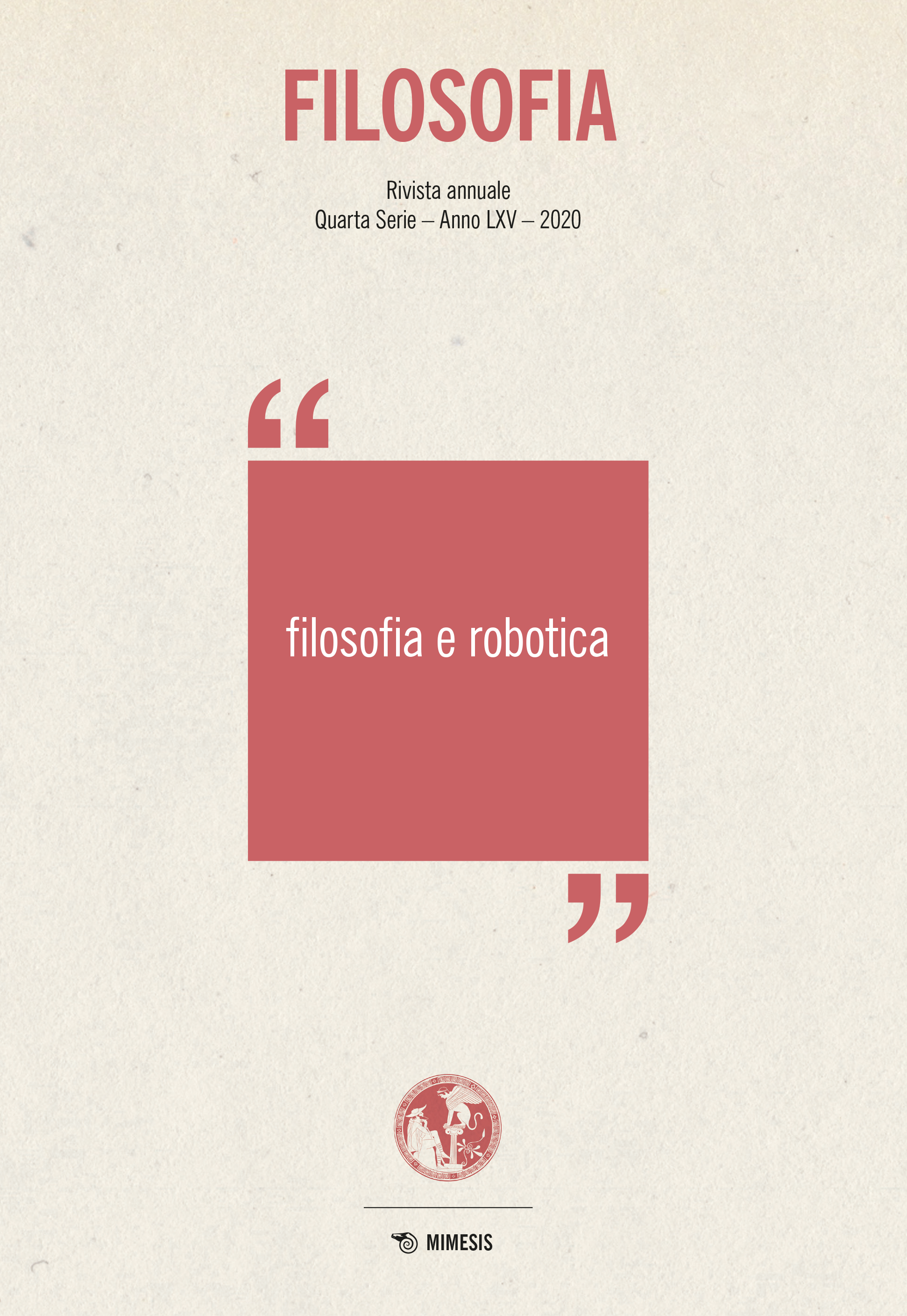Macchine leibniziane?
DOI:
https://doi.org/10.13135/2704-8195/5233Parole chiave:
concetto, animale, robot, DavidsonAbstract
Are robots capable of forming concepts? The problem can be addressed starting from a similar question, namely that relating to the possibility that animals are recognized as capable of forming concepts. Different positions have been addressed on this issue. A profitable possibility of analysis is offered by Davidson’s skeptical position in his influential Rational Animals. I examine some of the objections made to the position that denies that animals can form concepts. I affirm that none of these are conclusive and I draw the idea that if the ability to form concepts must be recognized to animals, then the same position must also be supported with respect to robots.
Downloads
Riferimenti bibliografici
Accoto, C. (2019), Il mondo ex machina. Cinque brevi lezioni di filosofia dell’automazione, Roma, Egea.
Alechina, N. and Logan, B. (2010), Belief ascription under bounded resources, “Synthese”, pp. 179-197.
Andrews, K. (2015), The Animal Mind: The Philosophy of Animal Cognition, London, Routledge.
Bacchini, F., Lorusso, L. (2019), Race, again. How face recognition technology reinforces racial discrimination, “Journal of Information, Communication and Ethics in Society”, pp. 321-335.
Bostrom, N. (2016), Superintelligence. Paths, Dangers, Strategies, Oxford, Oxford University Press.
Burgos, J.E, (2007), About Aboutness: Thoughts on Intentional Behaviorism, “Behavior and Philosophy”, pp. 65-76.
Carruthers, P. (2013), Animal Minds Are Real, (Distinctively) Human Mind Are Not, “American Philosophical Quarterly”, pp. 233-248.
Cingolani, R. (2019), L’altra specie. Otto domande su noi e loro, Bologna, Il Mulino.
Colin, A. (1999), Animal Concepts Revisited: The Use of Self-Monitoring as an Empirical Approach, “Erkenntnis”, pp. 33-40.
Danaher, J. (2016), The Threat of Algocracy: Reality, Resistance and Accommodation, “Philosophy & Technology”, pp. 245-268.
Davidson, D., (1980), Essays on Events and Actions, Oxford, Clarendon Press.
Davidson, D., (1985), Rational Animals, in LePore E. and B. McLaughlin (eds.), Actions and Events, Blackwell, Oxford, pp. 473-480.
Dennett, D. (1989), The Intentional Stance, New York, Bradford.
Domingos, P. (2017), The Master Algorithm: How the Quest for the Ultimate Learning Machine Will Remake Our World, London, Penguin.
Dworkin, G. (1988), The Theory and Practice of Autonomy, Cambridge, Cambridge University Press.
Funkhouser, E. (2017), Beliefs as signals: A new function for belief, “Philosophical Psychology”, pp. 809-831.
Fry, H. (2019), Hello World: Being Human in the Age of Algorithms, New York, Norton & Company.
Godfrey-Smith, P. (2017), Other Minds: The Octopus, the Sea, and the Deep Origins of Consciousness, New York, Farrar Straus & Giroux.
Glock, H. J. (2000), Animals, thoughts, and concepts, “Synthese”, 123: 35–64.
Glock, H. J. (2009), Can animals act for reasons? “Inquiry”, pp. 232-254.
Jago, M. (2014), The Problem of Rational Knowledge, “Erkenntnis”, pp. 1151-1168.
Leibniz, G. W. (2001), Monadologia, Milano, Bompiani.
Löhr, G. (2019), Embodied Cognition and Abstract Concepts: Do Concept Empiricists Leave Anything Out? , “Philosophical Psychology”, pp. 161-185.
MacIwan, I. (2019), Macchine come me e persone come voi, Torino, Einaudi.
Oliver, K. (2009), Duplicity Makes the Man Or, Can Animals Lie? in Martin, C., The Philosophy of Deception, pp. 104-117.
Oslo, K. (2010), Rationality in the Domesticated Dog and Other Non-Human Animals, “Teorema”, pp. 135-145.
Roelofs, L. (2017), Rational Agency without Self-Knowledge: Could ‘We’ Replace ‘I’? , “Dialectica”, pp. 3-33.
Rosslenbroich, B. (2014), On the Origin of Autonomy, New York, Springer.
Schneewind, J. (1997), The Invention of Autonomy: A History of Modern Moral Philosophy, Cambridge, Cambridge University Press.
Safina, C, (2016), Beyond Words: What Animals Think and Feel, London, Picador.
Sapolsky, R. (2018), Behave: The Biology of Humans at Our Best and Worst, New York, Vintage.
Stich, S. (1979), Do Animals Have Beliefs?, “Australasian Journal of Philosophy”, pp. 15-28.
Toribio, J. (2010), The Animal Concepts Debate: A Metaphilosophical Take, “Teorema”, pp. 11-24.
Vasilecas, O., Bugaite, D., Trinkunas, J. (2014), Knowledge Expressed By Ontology Transformation into Conceptual Model, “Communication and Cognition”, pp. 13-24.
Vespignani, A. (2019), L’algoritmo e l’oracolo. Come la scienza predice il futuro, Milano, Il Saggiatore.
##submission.downloads##
Pubblicato
Come citare
Fascicolo
Sezione
Licenza
Filosofia applica una licenza Creative Commons Attribution 4.0 International License a tutto il materiale pubblicato.



